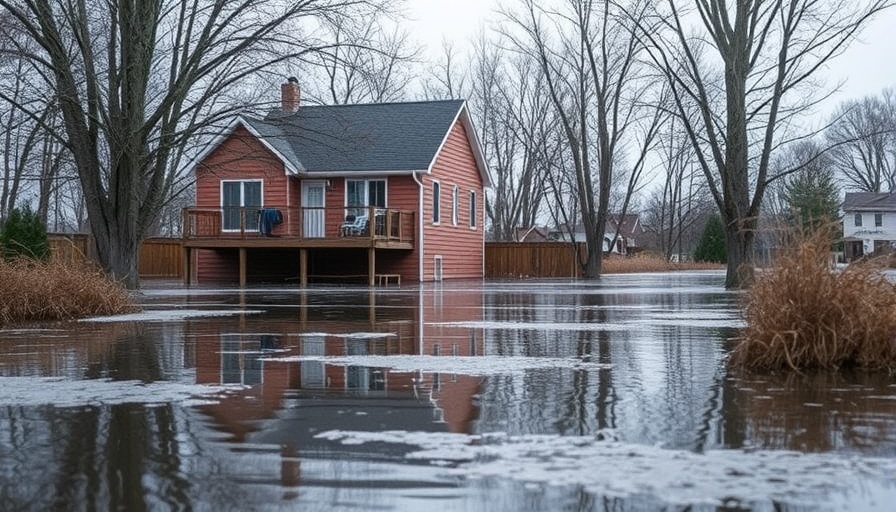
Understanding Flood Insurance in Wisconsin: A Necessary Primer
When floodwaters surge into your Wisconsin home, the aftermath can be overwhelming. The first step to recovering your property and managing the insurance claim process involves understanding the different facets of flood insurance. Many homeowners may believe that their standard homeowner's insurance covers floods, but often, this is a misconception. Generally, separate flood insurance is required. Knowing how to approach flood insurance claims can mean the difference between a swift recovery and a daunting ordeal.
Documenting Damage: The First Key Step
The moment it is safe to assess your home after flooding, begin the documentation process. Use your smartphone or camera to capture extensive evidence of the damage. Take clear photographs of water lines, structural harm, and any destroyed belongings. For insurance purposes, it's vital to provide comprehensive visual proof. Label each image with the date and a brief description, ensuring you have an organized record. As you photograph the physical damage, don’t forget to keep meticulous notes of any expenses associated with recovery—these might include repairs, temporary housing, and cleanup costs.
The Importance of Timeliness: Notify Your Insurer Quickly
Once documentation is in hand, notify your insurance agent without delay. Under Wisconsin law, your insurer is mandated to acknowledge your claim within 10 days. Early communication is essential; it shows your insurer that you are proactive about your recovery. This is where understanding the claims timeline becomes crucial. Familiarize yourself with your policy to ensure any correspondence from your insurer regarding your claim is managed promptly and accurately.
Claim Denials and Delays: Know the Red Flags
Unfortunately, even the most organized claims can meet obstacles. Be prepared for potential delays or, worse, denial of your claim. If this occurs, scrutinize your documents to confirm everything required was submitted. Often, a second review may be needed wherein additional information could be provided. Should confusion arise in the process, it’s advisable to consult with professionals like a public adjuster or a legal expert specializing in insurance claims. They can provide critical insights into why a claim might be denied and help you navigate through the red tape.
Understanding Insurance Adjusters: Their Role Explained
Insurance adjusters play a pivotal role in assessing the damage after a flood and evaluating the legitimacy of your insurance claim. It's common for individuals to feel intimidated when dealing with an adjuster. However, being informed about their roles and responsibilities can empower you. Adjusters work for the insurance company and aim to minimize payouts—instead of seeing them as allies, it’s essential to view them with cautious skepticism. Gathering ample evidence before their arrival can help mitigate any potential misjudgments regarding your claim.
Claim Negotiation Tips: Setting Yourself Up for Success
When it comes to insurance claims, negotiation doesn't have to be daunting. Equip yourself with knowledge of what coverage you have and be clear about your repair costs. Don't shy away from negotiating your settlement if it doesn’t align with your documented expenses. Utilize your evidence as leverage during these conversations. Having an experienced agent or attorney on your side during negotiations can further bolster your position, ensuring you get the compensation you rightfully deserve.
Looking Ahead: The Future of Flood Insurance in Wisconsin
As climate change increases the frequency and severity of floods in Wisconsin, understanding the implications for flood insurance becomes increasingly critical. Homeowners must stay informed about policy changes that can affect their coverage. Also, as the market adjusts to new realities, innovative insurance products could emerge offering better protection against flood damage. Staying proactive not only means addressing immediate claims but also preparing for future uncertainties.
As a vehicle owner dealing with accident-related property damage, the insights gleaned from understanding flood insurance can empower you in all your insurance dealings. And remember, whether you’re shrugging off minor repairs or recovering from significant damage, always communicate clearly and document thoroughly.
Final Thoughts: Empower Yourself
With a reliable record of damages and expenses and a strong understanding of your rights, you can navigate flood insurance claims with confidence. Don’t let intimidation or confusion stop you from reclaiming your space. Remember, knowing how to file a claim properly and understanding the claims process can empower you to advocate for yourself and protect your future.
 Add Row
Add Row  Add
Add 




Write A Comment